Suppose someone sent you a PowerPoint presentation that you'll be working on with your teammates. You can save it to a cloud location, such as OneDrive for Business, and then access it later using a variety of devices. Watch the video to see how this works on an iPad, and scroll down to see how to perform this task across a variety of devices.
The following procedure describes how to perform this task on an iPad. To see instructions for other devices, see Specific "how to" instructions for your device.
To save a PowerPoint presentation to OneDrive for Business using an iPad-
Begin with a PowerPoint presentation open in read-only mode on your iPad. If you want to use our example presentation, download it here: http://go.microsoft.com/fwlink/?LinkId=723572. Then open it in PowerPoint for iPad.
-
Tap Duplicate.
-
In your list of locations, choose your OneDrive for Business library, and then choose Create a Folder.
-
Type a name for your folder, and then choose Create. (For our example, we used Marketing presentations - 2016.)
-
Choose Duplicate.
Specific "how to" instructions for your device
Windows PC or tablet
-
Begin with a PowerPoint presentation open in read-only mode on your computer. If you want to use our example presentation, download it here: http://go.microsoft.com/fwlink/?LinkId=723572. Then open it in PowerPoint.
-
In PowerPoint 2016, choose Enable Editing.
-
Choose File > Save As, and then double-click (or double-tap) your OneDrive for Business library to open the Save As dialog box.
-
Choose New folder, type a name for your folder, and then choose Open. (For our example, we used Marketing presentations - 2016.)
-
Choose Save.
Tip: Need help with your OneDrive for Business app? See Update the OneDrive for Business sync app
Mac computer
-
Begin with a PowerPoint presentation open in read-only mode on your computer. If you want to use our example presentation, download it here: http://go.microsoft.com/fwlink/?LinkId=723572. Then open the file in PowerPoint 2016 for Mac.
-
Choose File > Save.
-
Choose Online Locations > OneDrive for Business.
If you don't see OneDrive for Business listed, click Plus (+) to add a service. Then, click Sign in, and sign in using your work or school account.
-
Specify a name for your presentation, and choose a location in your OneDrive for Business library.
-
Click Save.
Tip: Need help with your OneDrive for Business app? See Get started with the OneDrive for Business Next Generation Sync Client on Mac OS X
Android phone or tablet
-
Begin with a PowerPoint presentation open in read-only mode on your device. If you want to use our example presentation, download it here: http://go.microsoft.com/fwlink/?LinkId=723572. Then open the file in PowerPoint on your device.
-
Choose File > Save.
-
Choose OneDrive for Business.
If you don't see OneDrive for Business listed, choose Add a place > OneDrive - Business, and then sign in using your work or school account.
-
Specify a name for your presentation, and choose a location in your OneDrive for Business library.
-
Click Save.
Tip: Need help with your OneDrive for Business app? See Use OneDrive for Business in Android
iPad or iPhone
-
Begin with a PowerPoint presentation open in read-only mode on your device. If you want to use our example presentation, download it here: http://go.microsoft.com/fwlink/?LinkId=723572. Then open the file in PowerPoint for iPad.
-
In PowerPoint for iPad, sign in using your work or school account.
-
If the file is in read-only mode, choose Duplicate, and then choose your OneDrive for Business library.
-
Specify a name for your presentation, and then choose Duplicate.
Tip: Need help with your OneDrive for Business app? See Use the OneDrive for Business app on an iPhone or iPad
Windows Phone
-
Begin with a PowerPoint presentation open in read-only mode on your device. If you want to use our example presentation, download it here: http://go.microsoft.com/fwlink/?LinkId=723572. Then open the file in PowerPoint on your device.
-
In PowerPoint, tap the ellipses (...), and then choose Save As.
-
In the File name box, specify the name of your presentation.
-
In the Save to box, choose your OneDrive for Business library, and then choose Save.
Tip: Need help with your OneDrive for Business app? See Use OneDrive for Business on your Windows Phone
Office Online (browser on all devices)
-
Begin with a PowerPoint presentation saved to your device. If you want to use our example presentation, download it here: http://go.microsoft.com/fwlink/?LinkId=723572
-
Using the web browser on your device, go to http://portal.office.com and sign in using your work or school account.
-
On your home screen or using your Office 365 app launcher, choose OneDrive.
-
Depending on your device, either choose Upload or choose New > Upload Files.
-
Select your presentation. Depending on your device, you might have to choose Open to upload the file.
Want more?
My team is working on a marketing plan for the coming year.
I'm kicking things off with this presentation that Molly sent me as a starting point.
Since I opened this file from an email message, it's in read-only mode.
I need to save it somewhere so I can work on it. To do that, I'll tap Duplicate.
Here are some potential places to save the file.
I want to save this to the cloud, so I can access it from anywhere. I'll choose my OneDrive library and create a folder there.
I'll choose Duplicate to put my presentation there.
Now I'm ready to edit this file.
No comments:
Post a Comment